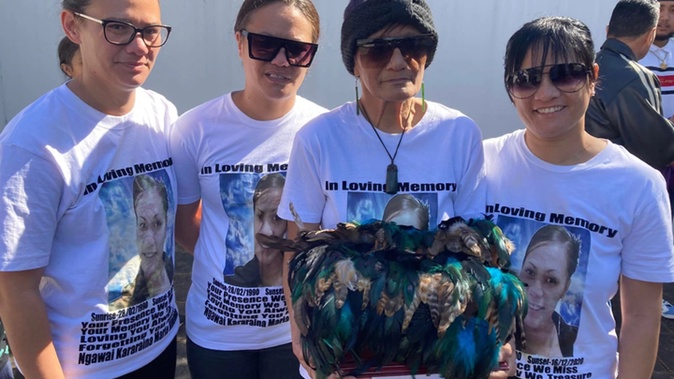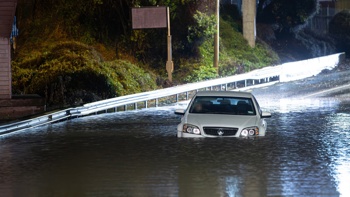

Warning: This story contains evidence of a violent nature which some readers may find upsetting
The family of a woman stabbed to death in front of her children say they can't understand how a human could "inflict such hideous violence on a person".
Now the killer, Cory Purutanga, can finally be named and the full horror of his crime can be detailed after his ongoing suppression lapsed at midnight yesterday.
The 35-year-old's long-time partner Ngawai Kararaina Maria Himiona had already suffered a beating at his hands on December 16, 2020, when the eldest of their four children phoned Purutanga's parents fearing another assault.
According to a police summary of facts, the children's grandmother arrived at the couple's Hamilton home at about 9.15pm and was initially able to calm her son down.
However, because of Purutanga's earlier behaviour, she called her husband to collect the two oldest children.
Himiona went into a bedroom with the two younger children, putting the young baby to sleep between her legs on the bed, while Purutanga's mother tried to keep him busy in the kitchen.
The young mum called police, telling them, "If I hang up it's because he's coming", before shortly after saying, "Here he comes".
/cloudfront-ap-southeast-2.images.arcpublishing.com/nzme/7ALRFEHCFT4MYNANPG33T5PZ5Y.png)
- Grandfather escapes with child as man wields butcher's knife, attacks woman
- Calls for GPs to be trained more to treat domestic violence victims
Police at the scene the morning after the murder in December 2020. Photo / Belinda Feek
Purutanga charged past his mother, grabbed and checked Himiona's phone before going to get a large boning knife from the kitchen.
He pushed his mother out of the way so he could go back into the bedroom, leapt on top of Himiona, and stabbed her 17 times.
Their 4-year-old child was also in the room at the time.
Purutanga's mother attempted to intervene but he sliced her hand twice as she tried unsuccessfully to stop the attack.
After he'd finished and as Himiona took her last breaths Purutanga fled, driving to his parent's house and telling his dad; "Dad, I've done bad, I have done bad".
'How can a human inflict such hideous violence'
Speaking outside court after Purutanga was jailed for 17 years in August, Himiona's aunt Hinemaua Rikirangi said whānau were still trying to comprehend how he could do something so horrific to his children's mother.
"Even hearing that again [last month] one has to ask how can a human being possibly inflict such hideous violence on a person who is less than half of his size and weight," Rikirangi said.
"As I was sitting there I was thinking it wasn't one, two, or three, wasn't that even enough.
"With the sort of force and brutality, it's even really hard to comprehend how anybody could actually do that.
"That makes it hard for us to comprehend and so that was really hard hearing that again ... the force that was inflicted upon her."
Looking forward, she now hoped that others would learn from Himiona's death. Knowing that domestic violence was wrong but also where to find help.
"How can whānau reach out for help and how do men reach out for help and support and know that violence against women and in the home of children has to stop?
"We can't just let this come to a sentence and that's it ... we've got to be able to put this out there and as a force and movement to say to stop family violence, stop the violence in the home."
/cloudfront-ap-southeast-2.images.arcpublishing.com/nzme/BJIFZA6QD6BJYOJQZDHQMGU75M.png)
Ngawai Kararaina Maria Himiona, a loving mother of four children, was brutally murdered in her Hamilton home in December 2020. Photo / Supplied
She said violence in the home shouldn't just be blamed on drugs, "because we all make choices and it's what we do with that".
She wanted people to reach out for help and those on the sidelines to step up.
"We cannot be sitting by watching. We have to know when there comes a point to say it's time to get help.
"I don't want this and what's happened to Ngawai to be in vain and for nothing and [for her to be] another statistic."
She said although Purutanga's sentencing would never bring Himiona back, it finally meant the whānau could start the healing process.
Asked how Himiona's children were doing, she replied, "remarkably well in as much as any children can do".
Why lifting name suppression was important
In a hearing earlier this month, Purutanga's lawyer Kerry Burroughs wanted his client's name suppression to be permanent, to protect the children, he said.
Burroughs pointed to a clinical psychologist's report that stated "issues" would later arise for the children if it were lifted.
"We always seem to forget the children. We never really put their issues first."
He was also concerned with the internet, that once Purutanga's name was published, it would be there to forever haunt them.
"So these children can go through their whole lives where an article of their father's name is mentioned."
However, Crown prosecutor Jacinda Hamilton said the application for name suppression was only to benefit Purutanga, and those close to the whānau already knew who the children were.
Suppression would stop the children and whānau from being able to openly discuss their loss.
She supported the suppression of the children's names, but their mother's name was already out there and the father's should be too, she said.
/cloudfront-ap-southeast-2.images.arcpublishing.com/nzme/TF7MENHZP6LUVQXTEJDQB2YT4Y.png)
Ngawai Hinemoa's whanau, including mother Donna (far left) at the High Court at Hamilton. Photo / Belinda Feek
Justice Graham Lang said he had "considerable sympathy for the position in which the children find themselves through no fault of their own".
"However, I do not consider the information contained in the psychologist's report demonstrates that they are likely to suffer extreme or undue hardship if their father's name is published."
He said the hardship they'd suffered to date was the result of their family environment and the fact that their father killed their mother.
"Those issues will require considerable resources to address, but this flows from matters unrelated to the issue of publication of their father."
He added that most of the publicity about Purutanga's offending had all but now occurred, shielding the children from it.
He expected publicity to recede quickly and added that he was heartened to see the children were now being cared for in a stable environment at relatives of Purutanga.
"They've needed a lot of support and they're going to need a lot of support because they've lost both their mother and if you like, their father, for so many years but they are doing remarkably well."
Haimona's whānau spent time with the children prior to the sentencing and added that it was important they knew what was going on.
"Transparency and honesty right from the outset with these tamariki and taking them on the journey as well, that's really important in terms of their own healing and their own ways of how they reconcile what this means for them so they're the most important focus now."
Where to go for help or more information:
• Shine, free national helpline 9am- 11pm every day - 0508 744 633 www.2shine.org.nz
• Women's Refuge: Free national crisis line operates 24/7 - 0800 refuge or 0800 733 843 www.womensrefuge.org.nz
• Shakti: Providing specialist cultural services for African, Asian and middle eastern women and their children. Crisis line 24/7 0800 742 584
• It's Not Ok: Information line 0800 456 450 www.areyouok.org.nz
Take your Radio, Podcasts and Music with you









